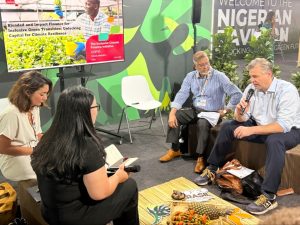This article was originally published by AFI. It has been adapted below.
AFI and its partners, including the University of Luxembourg co-hosted three side events, two of which were held in the Luxembourg pavilion, at COP30 in Belém, Brazil, spotlighting the crucial role financial policymakers play in driving an inclusive green transition. The sessions brought together regulators, central banks, funders and financial experts to share insights on making Inclusive Green Finance (IGF) more accessible and effective.
“Today, more than 70 central banks and financial regulators from developing economies are working together to advance Inclusive Green Finance,” said AFI CEO, Alfred Hannig. “By designing climate-smart policies that include green financing mechanisms, AFI’s members are taking the lead on IGF globally – building the climate resilience of communities and economies that are disproportionately hit by climate change.”
Blended and impact finance for an inclusive green transition
On 13 November, AFI, the University of Luxembourg and Appui au Développement Autonome (ADA) co-hosted a session on how blended and impact-oriented finance, using public and philanthropic capital to attract private investment, can sustainably fund IGF initiatives.
“Impact finance can make a targeted contribution to achieving the SDGs,” said Prof. Dirk Zetzsche, ADA Chair in Financial Law at the University of Luxembourg. “It supports Inclusive Green Finance by using blended finance to channel capital effectively. Our research shows that success depends on having clear impact metrics, focusing on a few key sustainability goals, and ensuring strong cooperation between project partners.”
Speakers showcased practical examples of financing models that can unlock capital to drive climate-resilient investments for vulnerable populations, particularly MSMEs.
Aligning climate risk regulation with financial inclusion
On 14 November, AFI, Agence française de développement (AFD) and the University of Luxembourg hosted a panel on inclusive, proportionate climate risk regulation. The event, closely aligned with COP30’s focus on climate justice and adaptation, marked the launch of AFI’s forthcoming knowledge product: Enabling Green Transition Through Inclusive Green Finance and Proportional Sustainable Finance Standards, developed by its Inclusive Green Finance and Global Standards and Proportionality Working Groups.
“Ensuring proportionality in financial regulation, including in climate risk disclosures, is essential,” stressed AFD’s Brazil Deputy Head, Léo Gaborit. “We see an important role for central banks in this context.”
Claudio Filgueiras, Head of Rural Credit at the Central Bank of Brazil (BCB), confirmed this, noting BCB’s key role in collecting and sharing comprehensive data on “environmental risks and vulnerabilities” to guide financial institutions in their green finance efforts.
Together, the three events highlighted the pivotal role IGF plays in ensuring that climate action supports, rather than sidelines, vulnerable communities.
“This is the first time AFI has been invited to host three side events at COP,” highlighted AFI’s Head of Inclusive Green Finance, Johanna Nyman. “This reflects the growing importance global stakeholders are placing on Inclusive Green Finance within the broader climate finance agenda.”
COP30 also marked AFI’s first year as an official observer to the United Nations Framework Convention on Climate Change (UNFCCC), allowing the organisation to follow negotiations, support transparency and contribute technical expertise directly to the process.
